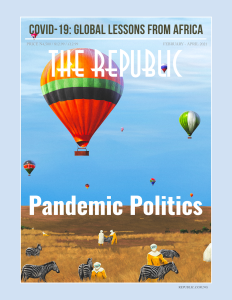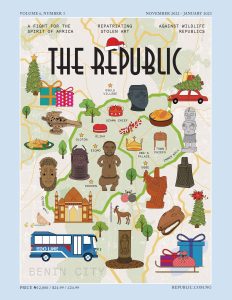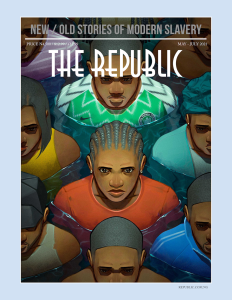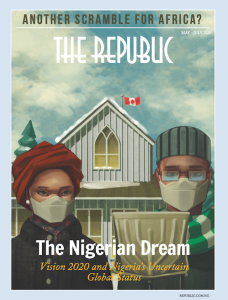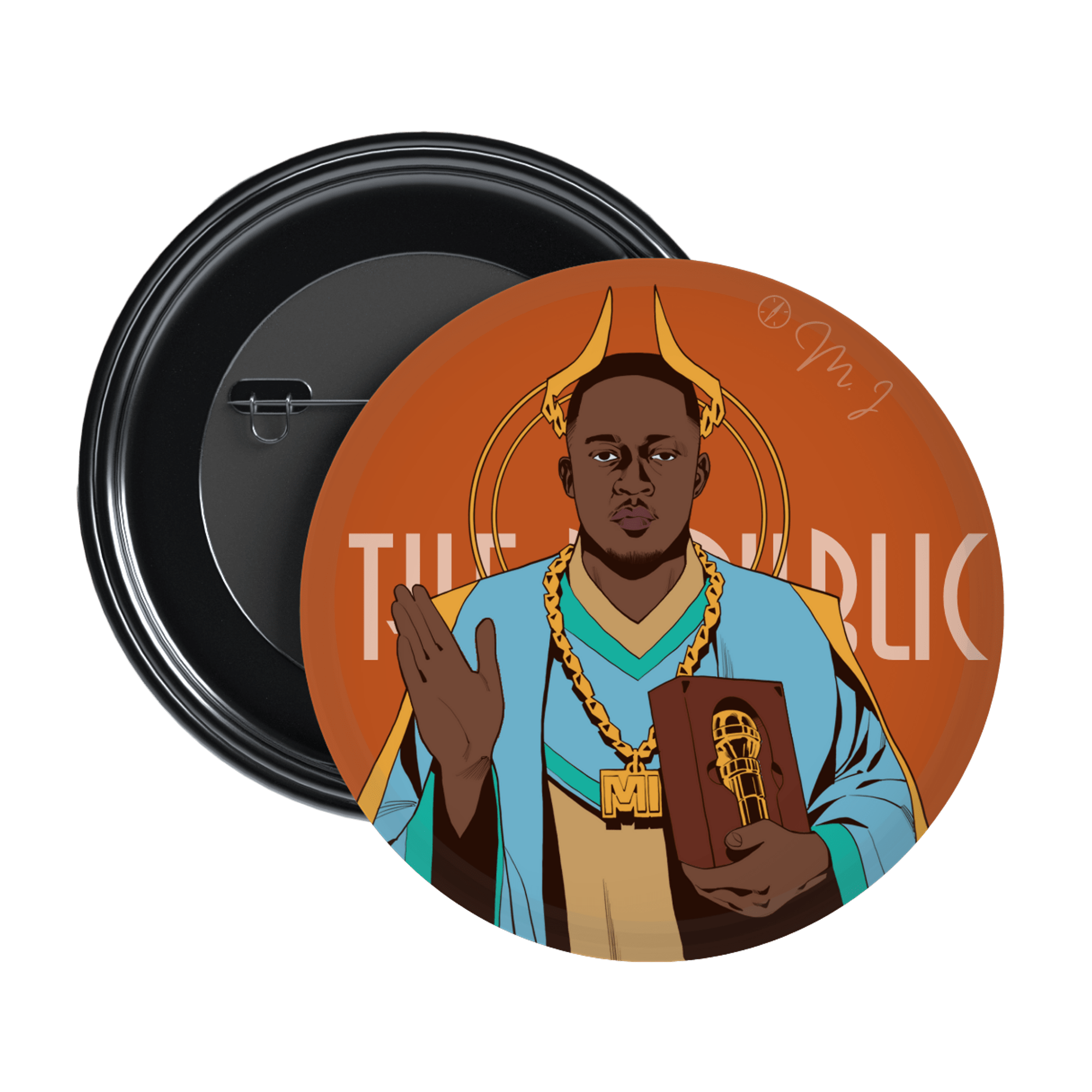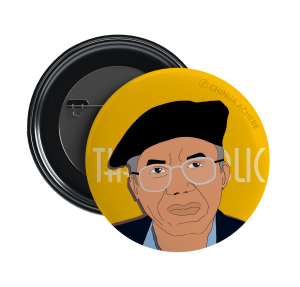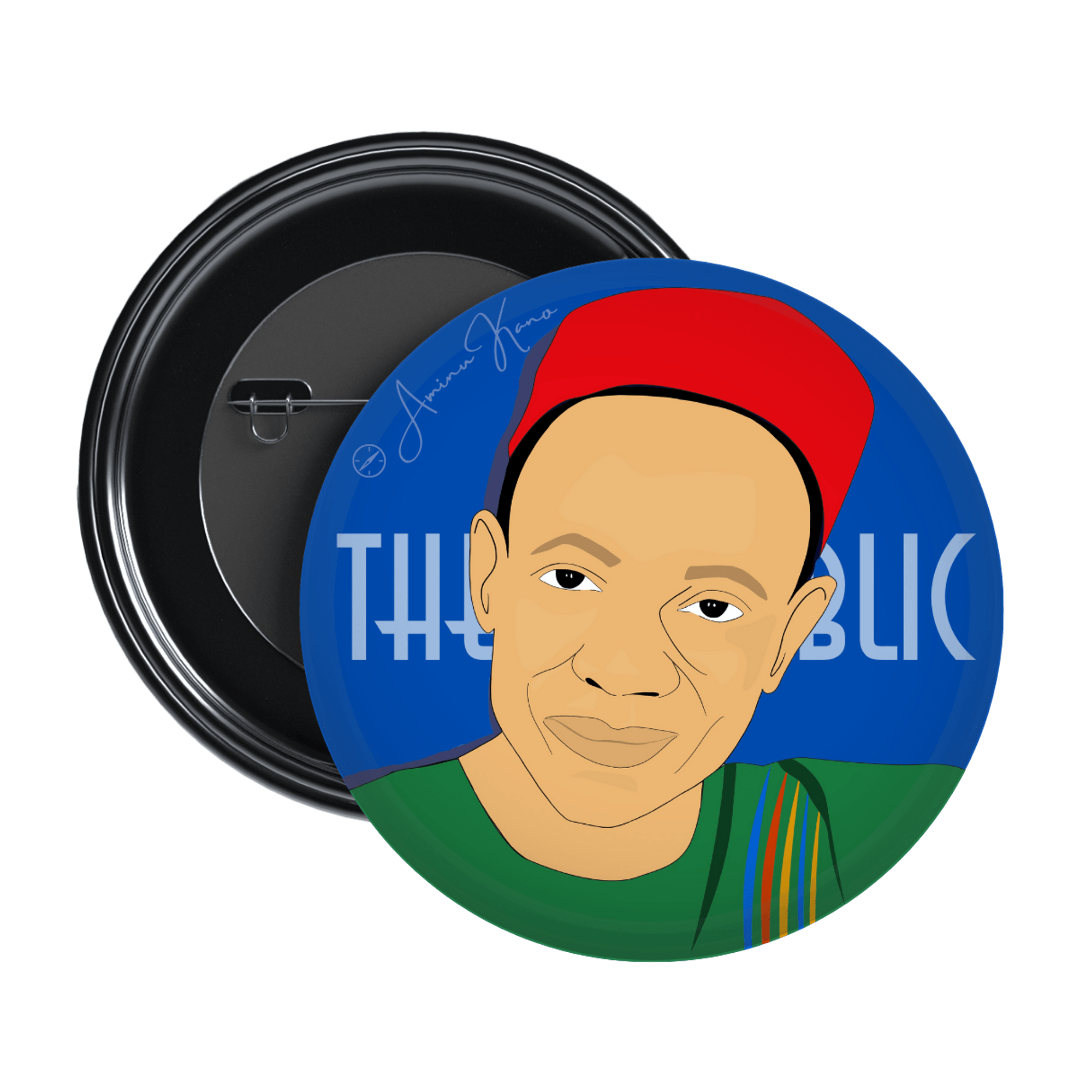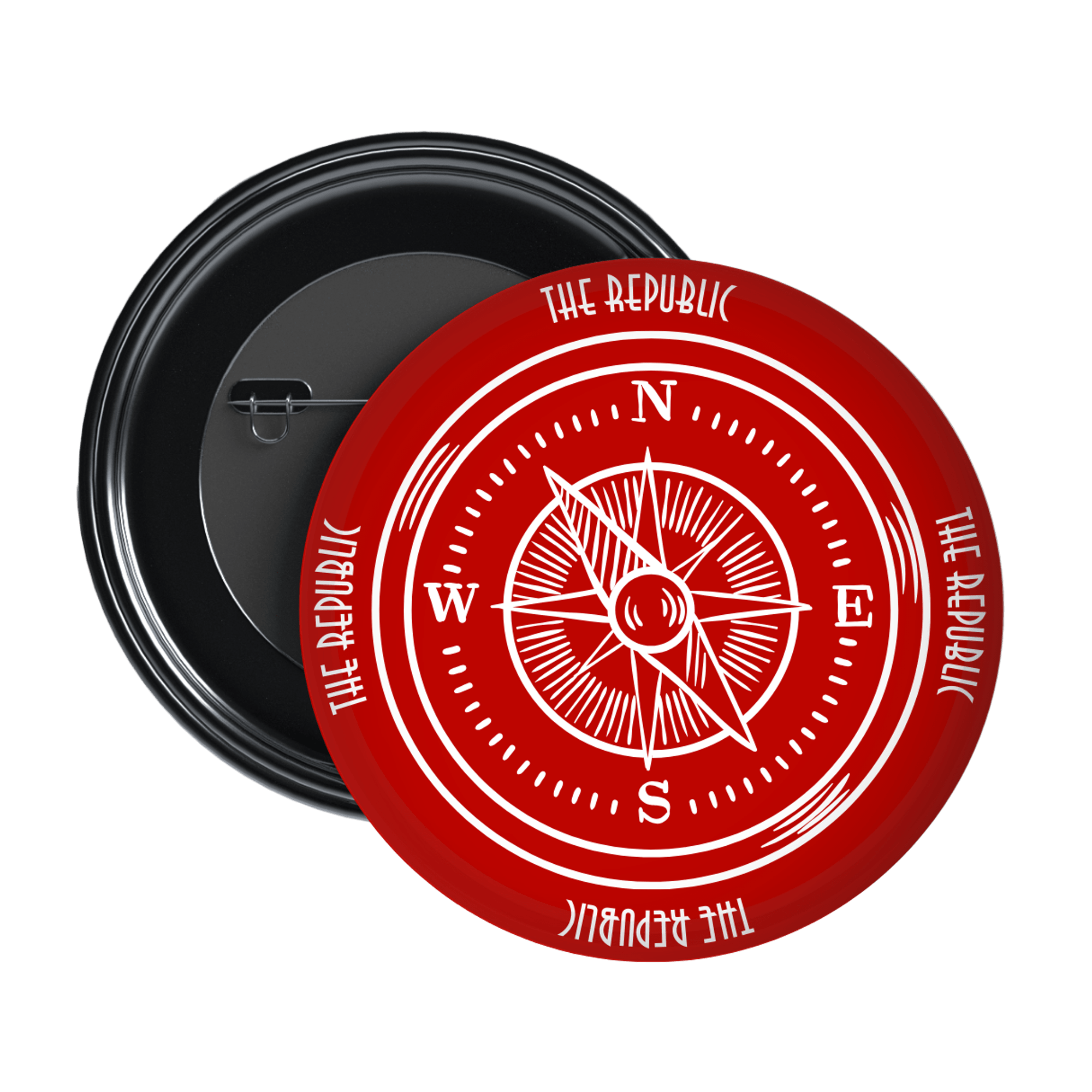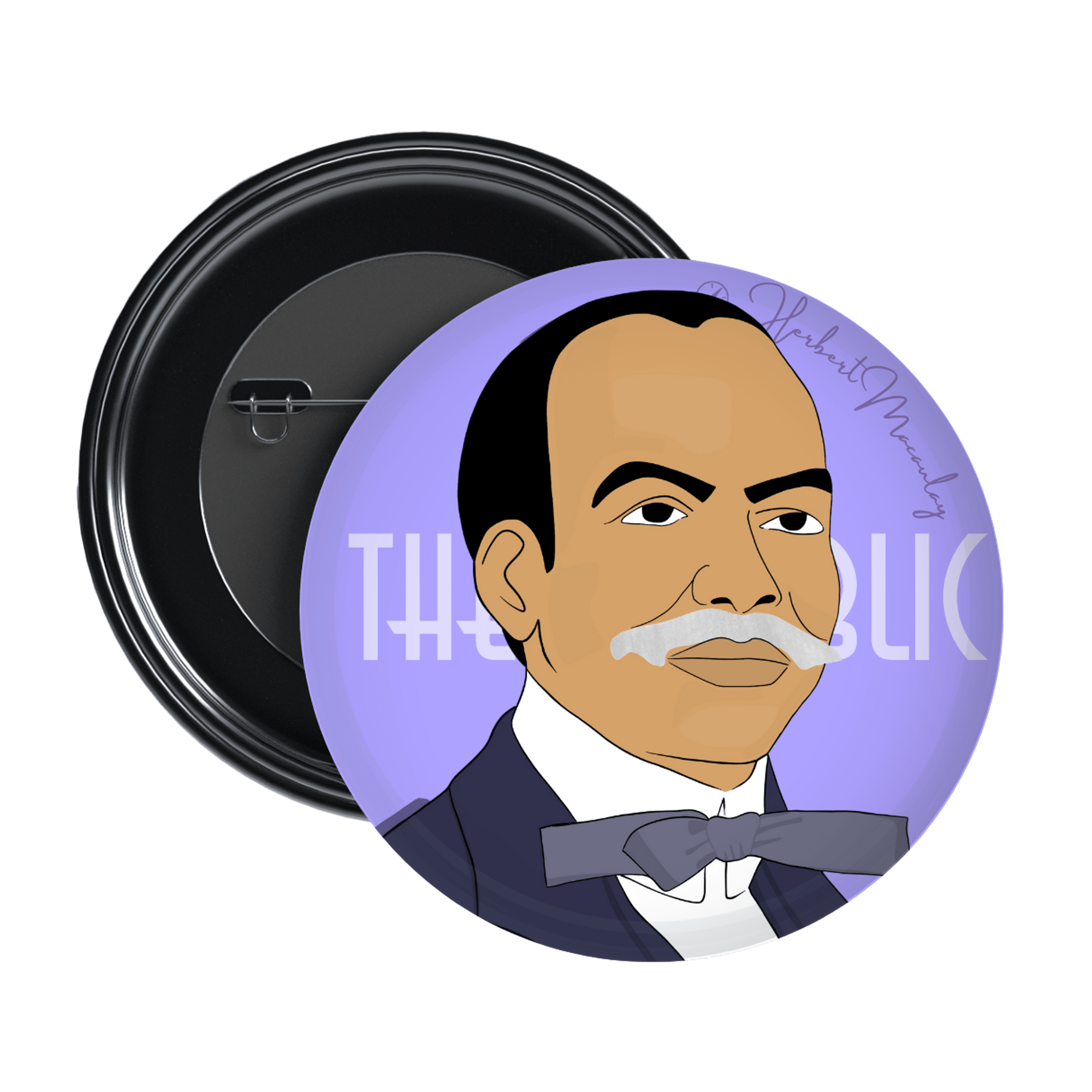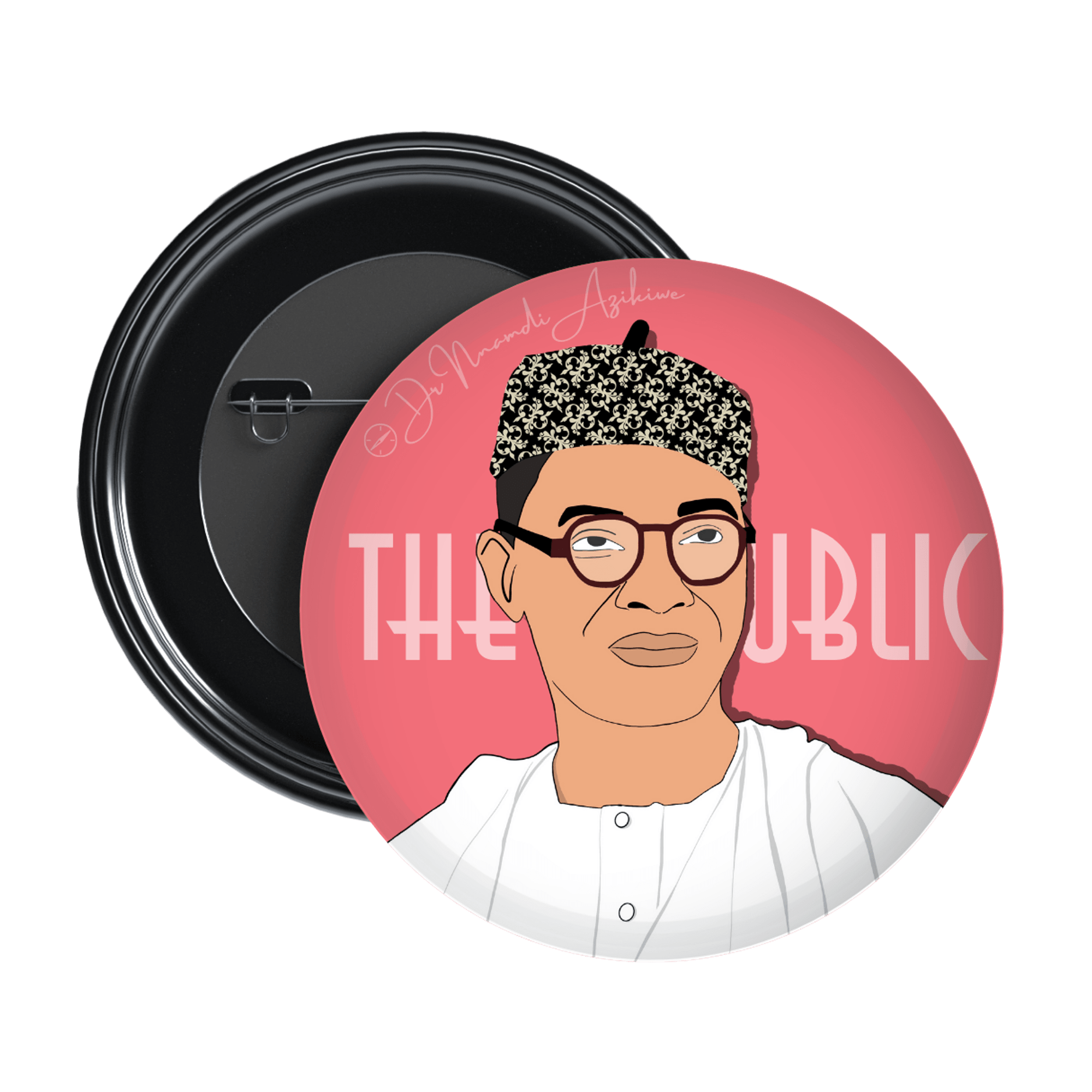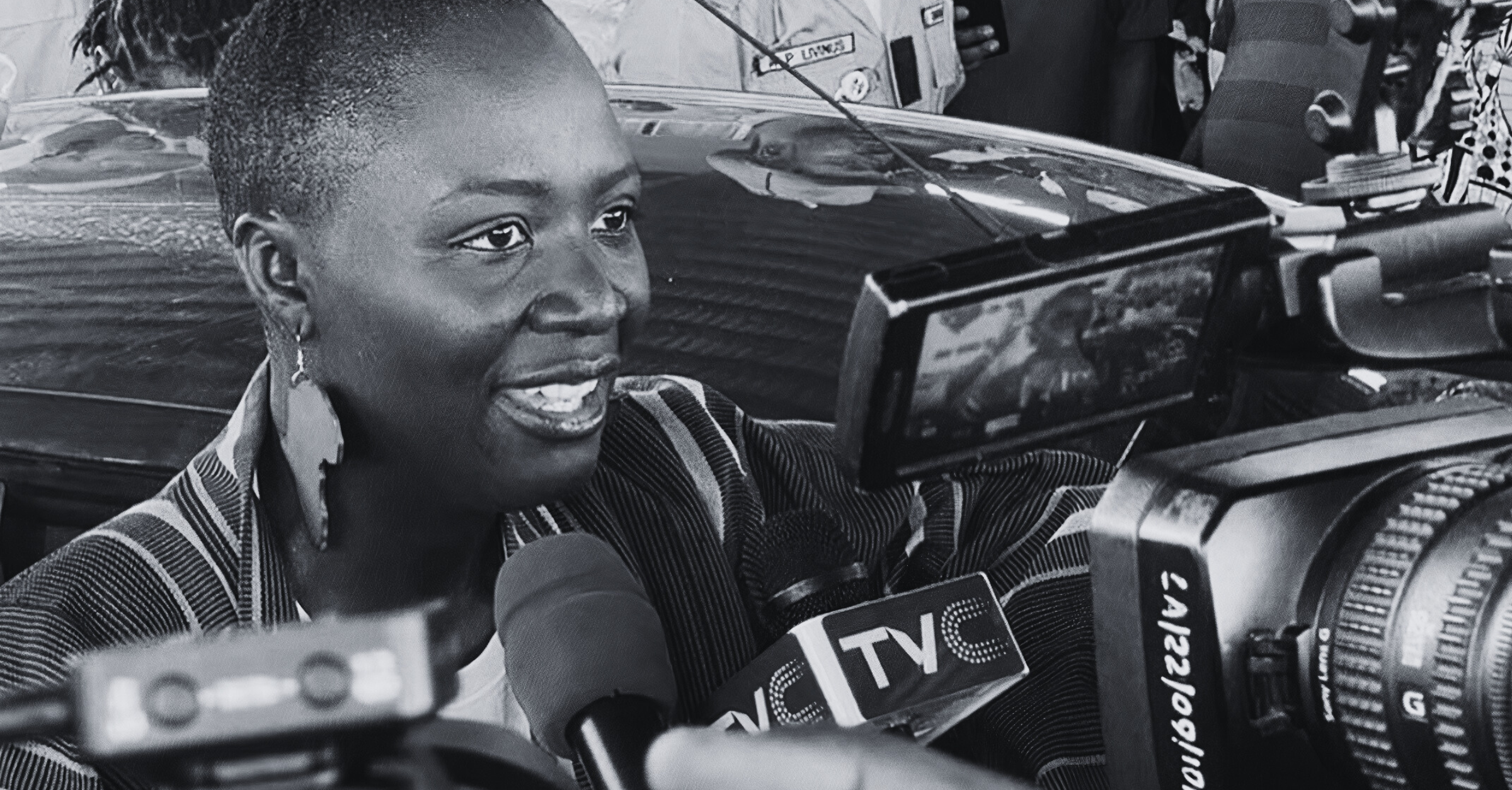
Pelumi Nubi arrives in Lagos, April 2024. PREMIUM TIMES NG / THE REPUBLIC.
the ministry OF BUSINESS X THE ECONOMY
Pelumi Nubi’s Epic Solo Drive

Pelumi Nubi arrives in Lagos, April 2024. PREMIUM TIMES NG / THE REPUBLIC.
the ministry OF BUSINESS X THE ECONOMY
Pelumi Nubi’s Epic Solo Drive
On 7 April 2024, on the sprawling campus of the University of Lagos, British-Nigerian travel influencer and content creator, Pelumi Nubi, was celebrated for completing her two-month-long solo drive from London to Lagos. One woman crossed 17 countries, including most of West Africa, in a tiny purple Peugeot 206, fondly called Lumi. It was only fitting that the feat would be accomplished and celebrated in Lagos—not just because Lagos is Nubi’s birthplace and childhood home, but more so because the journey ended where the freedom to move in the way that Nubi had done had been conceived.
ALL ROADS LEAD TO LAGOS
On 28 May 1975, in Lagos, 16 countries signed the Economic Community of West African States (ECOWAS) treaty with the mission of promoting economic integration within West Africa. The current membership slightly differs: Cape Verde joined the economic community in 1977, while Mauritania withdrew its membership in 2000. More recently, Burkina Faso, Niger, and Mali have expressed desires to leave the community to form a union amongst themselves. These Sahel countries accuse ECOWAS of failing to address terrorism and being a puppet for external powers, calling post-coup sanctions illegitimate.
At its outset, the primary aim of ECOWAS was to raise the living standards of member states’ peoples, maintain and enhance economic stability, foster relations among member states and contribute to the progress and development of the African continent.
Economic integration varies in intensity, from free trade areas that involve the removal of tariffs on goods to a total political union where states form a single sovereign entity. The early 1960s debates between the Monrovia vs Casablanca groups leading to the formation of the Organisation of African Unity, the precursor to the African Union (AU), sidelined ambitions for a multilateral political union of African states. Instead, the focus shifted towards progressive economic integration as favoured by the Monrovia Group. Thus, ECOWAS was conceived with the idea of progressive integration culminating in a union just shy of political integration. This is reflected in the community’s objectives that express a desire to establish a free trade area and then progress into a common market where all trade barriers are eliminated and common external trade and tariff policy exists. This was meant to lead to the establishment of a customs union that included a common monetary policy.
As part of this grand tapestry, in 1979 ECOWAS adopted Protocol A/P.1/5/79 relating to the free movement of persons, residence, and establishment. The ECOWAS treaty envisioned this protocol, as it stated that the free movement of persons, services, and capital was essential to the achievement of economic integration and thus committed member states to abolish obstacles hindering this movement. In line with this, community citizenship was established under Article 27 of the treaty.
Nubi’s journey across most of West Africa only asserted one of her rights as an ECOWAS citizen. The Free Movement Protocol asserts that community citizens have the right to enter, reside and establish in the territory of any member state which was to be progressively implemented within a maximum period of 15 years. This meant that by 1994, all aspects of free movement should have been fully operational. This was to occur in three phases. The first phase of free entry and the abolition of visas, took effect in 1980, providing ECOWAS citizens 90-day visa-free entry into any member state. In 1986, the second phase was ratified, asserting the right of residence in the territory of any member state. Finally, the third phase asserts the right of establishment, allowing citizens to set up businesses in any member state. Whilst 15 years have elapsed, this phase is yet to be ratified.
shop the republic
-
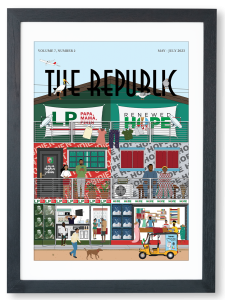 ₦70,000.00 – ₦75,000.00Select options This product has multiple variants. The options may be chosen on the product page
₦70,000.00 – ₦75,000.00Select options This product has multiple variants. The options may be chosen on the product page -
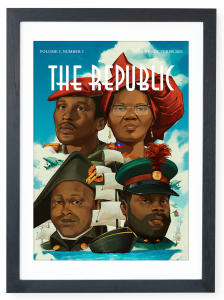 ₦70,000.00 – ₦75,000.00Select options This product has multiple variants. The options may be chosen on the product page
₦70,000.00 – ₦75,000.00Select options This product has multiple variants. The options may be chosen on the product page -
 ₦70,000.00 – ₦75,000.00Select options This product has multiple variants. The options may be chosen on the product page
₦70,000.00 – ₦75,000.00Select options This product has multiple variants. The options may be chosen on the product page -
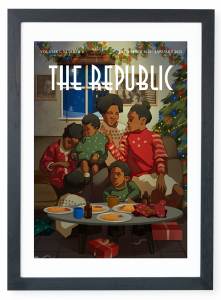 ₦70,000.00 – ₦75,000.00Select options This product has multiple variants. The options may be chosen on the product page
₦70,000.00 – ₦75,000.00Select options This product has multiple variants. The options may be chosen on the product page
shop the republic
-
 ₦70,000.00 – ₦75,000.00Select options This product has multiple variants. The options may be chosen on the product page
₦70,000.00 – ₦75,000.00Select options This product has multiple variants. The options may be chosen on the product page
THE PRICE OF FREEDOM
Nubi’s journey is remarkable as she is the first Black woman to solo-drive the 10,000 kilometres from London to Lagos. The extensive documentation of the trip on social media helped shed light on the rich and beautiful cultures in West Africa and the realities of intra-ECOWAS travel. Only a year before, Kunle Adeyanju, a Nigerian professional motorcyclist, rode a motorbike from London to Lagos within 41 days to raise money for polio. Journeying through 17 or 13 countries is newsworthy; the visibility does more for ECOWAS citizens by highlighting the realities of simply crossing from one border to another for leisure, tourism, and most importantly trade.
In a January 2024 podcast interview, Nubi noted that she had been planning this trip since September 2022. Despite her meticulous planning, she encountered a series of issues in exercising her right to free entry. At the Senegalese border, she, or rather Lumi, was denied entry. Customs officials informed her that she was free to enter but that she required a carnet de passage for her car. This document attests that the vehicle will not remain in the territory for longer than the 90-day window. The Free Movement Protocol, understanding how crucial the movement of vehicles is to free entry, makes provisions for the entry of private and commercial vehicles in the territory of member states provided that there is some documentation. Nubi and Lumi were finally given the green light after negotiating the fee quoted by customs for the document.
While entry is free in principle, in practice, it is not. Corruption is rife at borders. In a 2022 essay on free movement within the ECOWAS region, migration experts, Faisal Garba and Thomas Yeboah, highlighted that extortion and harassment of migrants at West Africa’s borders is one of the greatest challenges to free movement. Besides her experience in Senegal, Nubi also had difficulty entering Côte d’Ivoire. Border officials requested she pay CFA 60,000 which she refused to do unless an official receipt was given. This led to her waiting at the border for over nine hours before finally being granted entry. Member states have the right to refuse entry to ECOWAS citizens on the basis of them being inadmissible migrants. However, this is different from charging a separate fee akin to a visa fee, especially when citizens already possess valid travel documents.
The validity and recognition of travel documents also impede entry. For instance, to ensure ease of movement, Ghana and Sierra Leone harmonized immigration procedures and travel documents by adopting the 1985 ECOWAS travel certificate and the immigration and emigration forms. Hence, community citizens should be able to use travel certificates and the carte d’identité. However, there is a lack of awareness of its existence among many citizens and officials that even when used, it has been rejected by Ghanaian border officials who only acknowledge the ECOWAS passport.
Security challenges limit the freedom of movement. In conversation with Jola Ayeye and FK Abudu, hosts of the I Said What I Said podcast in April 2024, Nubi mentioned that although she had planned an entire tour of West Africa, she did not go through Burkina Faso due to the recent coup. The levels of insecurity across the region also create the need for heightened border measures, which can restrict the ease with which movement and trade occur. Europe’s interest in curbing migration from West Africa has led to increased border posts, which affects people’s ability to move freely.
These obstacles are heightened in the case of informal migration at land borders. Many community citizens frequently traverse borders for trade or as part of keeping connection with their ethnic groups that are dispersed across member states. When citizens do not possess the right documents and are unaware of their rights, they can be made to pay huge sums. Many citizens possess some form of identification, but the lack of passports among citizens crossing borders opens them up to exploitation by officers. Informal movement and informal trade are the norm in ECOWAS, yet there has been little attempt to address this informality by meeting citizens where they are.
Due to the challenges of asserting her right to entry, Nubi slept at three land borders—Liberia, Senegal, and Côte d’Ivoire. In Liberia, she needed the intervention of the Nigerian embassy to aid her movement. While the embassy is carrying out its duty of helping its nationals abroad, this does not happen for the millions of community citizens that cross intra-ECOWAS borders yearly. Nubi had a highly documented journey with a lot of support on social media, which already gave her leverage in crossing through or gaining assistance from her home state. As a leisure traveller, she also had a greater luxury of time. For many who cross the border, there is no embassy or chargé d’affaires to come to their aid, no choice of sleeping at the border, and no option but to yield to the whims of the almighty power of border officials. For them, there is a monetary price for freedom.
shop the republic
shop the republic
-
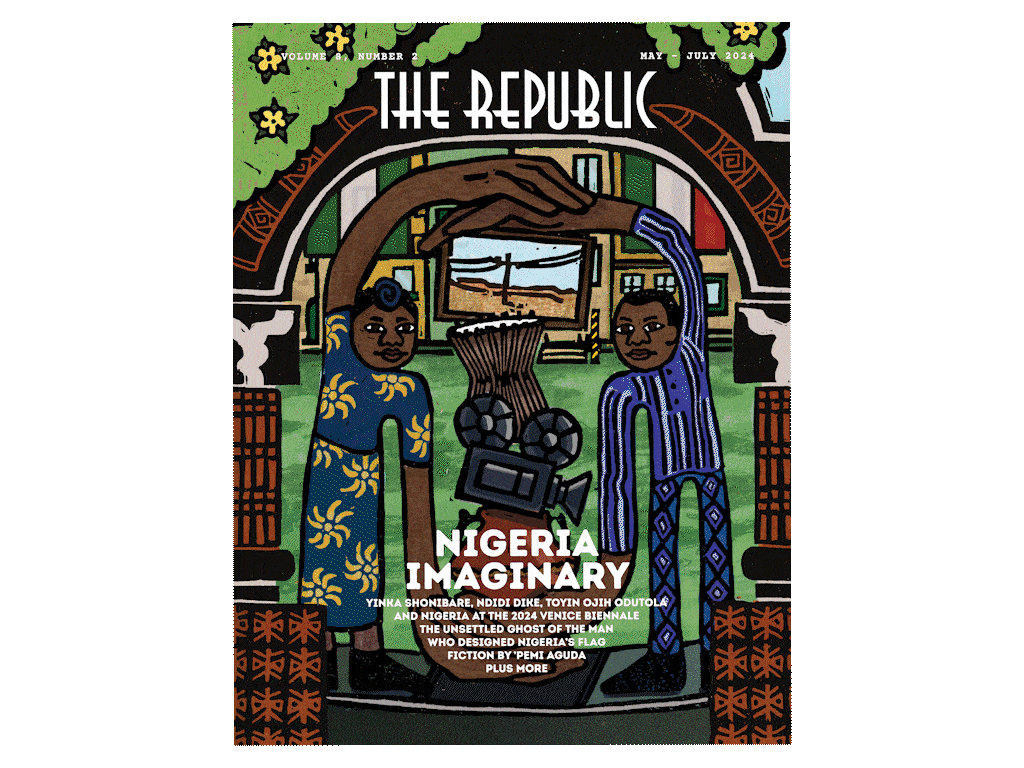 ₦10,000.00 – ₦30,000.00Select options This product has multiple variants. The options may be chosen on the product page
₦10,000.00 – ₦30,000.00Select options This product has multiple variants. The options may be chosen on the product page
THE NECESSITY OF FREE MOVEMENT
The free movement of people is essential to achieving free trade to facilitate the movement of goods and services across borders. For ECOWAS, free movement also recognizes the cultural history of the region. Pre-colonization, West Africa has been home to various ethnic groups with a shared cultural history that now spans across several existing states. During the scramble for Africa in the late nineteenth century, Europeans drew borders with little regard for the social and cultural realities of African people. This has led to scenarios where ethnic groups are divided across countries. For instance, pre-dominant ethnic groups in Nigeria like the Yorubas are spread across southwestern Nigeria and Benin Republic, and the Hausas in northern Nigeria are also found within Niger and Mali.
The right of movement and of residence encompassed within the protocol also serve a greater purpose rooted in the decolonization process. During the decolonization of Spanish territories in the late 19th century, the principle of uti possidetis juris emerged. This principle provided that all newly independent states would retain their colonial boundaries. While it was clear that many colonial boundaries had been arbitrarily drawn, the principle emerged to prevent potentially violent conflicts if new boundaries were to be redrawn. It was also meant to simplify the decolonization process because if newly independent states retained the same character as pre-existing ones, it would be easier for them to get international recognition—which is an essential characteristic of statehood. This principle applied during Africa’s decolonization in the late 1950s and early 1960s. Thus, these freedoms serve to placate community citizens for the continued existence of arbitrary borders, as members of the same ethnic groups can freely move to connect and reside with their communities.
Free movement as a part of economic integration allows for labour mobility. People often move for economic reasons and the receiving country gains from an increase in productivity and innovation. In the 1980s, when the protocol was enjoying its early years of implementation, many nations suffered economic shocks. Consequently, migrants from Ghana, Chad, and Cameroon moved to Nigeria for work. However, when Nigeria started experiencing its own financial woes following a crash in global oil prices, it revoked the protocol and started to deport ‘illegal migrants’. In 1983, the then president, Shehu Shagari expelled two million alleged illegal immigrants, many of whom were Ghanaians. At the time, Lagos traders frequently sold unnamed checkered bags which could hold a large quantity of items. These bags were brought out for the migrants to leave, coining the now infamous name, Ghana Must Go.
A similar move was taken in the 1990s by Côte d’Ivoire. Owing to the high rate of criminal activities and youth unemployment, which was blamed on migrants, Côte d’Ivoire reneged on liberal migrant policies leading to the expulsion of about four million migrants from Mali, Burkina Faso, and Togo.
Article 4 of the ECOWAS Free Movement Protocol asserts that member states reserve the right to refuse entry of any ECOWAS citizen deemed an inadmissible immigrant under domestic laws. However, there is no guidance or oversight on the use of this terminology, which means that the many community citizens who participate in irregular and informal migration can easily be denied their rights.
Although free movement is essential to free trade, till today, restrictions on the freedom of movement have ironically been justified to promote a state’s economic growth and development. In 2019, Nigeria closed its borders for almost a year to stop the importation of rice to boost local production. This led to hardship for communities living along the border who rely heavily on cross-border trade. The move was counter-productive as it posed a serious threat to policy cohesion within ECOWAS. Such measures are also used to justify other states’ moves in disregarding their obligations under the ECOWAS treaty and the Free Movement Protocol. Ghana has taken similar restrictive policies for migrants to exist in the retail space, such as forcible shop closures of Nigerian traders in 2020. Nigeria’s continued border closures were then used to strengthen arguments in support of anti-immigrant measures taken by the Ghana Union of Trade Workers.
shop the republic
FROM SUB-REGIONAL TO REGIONAL
Among Africa’s regional economic communities, ECOWAS is undoubtedly the most integrated. It recognizes the existence of citizens of the community which is reflected in the passports of member states. You are first a community citizen before your nationality. ECOWAS has also been implementing its free movement protocol since the 1980s. Thus, its experiences are crucial for conversations regarding the free movement of people on the wider African continent.
As part of the implementation of the AU’s Agenda 2063, the strategic blueprint for Africa’s growth, in 2019, AU member states established the African Continental Free Trade Area (AfCFTA) to ensure deepened economic integration and an increase in intra-African trade. Understanding that economic integration also requires the integration of peoples, in 2018 the AU adopted a protocol to the 1991 Abuja Treaty on free movement. The AU’s Free Movement Protocol is similar to that of ECOWAS, in that it recognizes three rights: movement of persons, residence and establishment. Yet, as of 2022, only four countries—Rwanda, Niger, Mali, and São Tomé and Príncipe—have ratified the AU’s free movement protocol. This is abysmal compared with the 48 countries that have ratified the AfCFTA Agreement.
Nubi and Lumi’s travels from London to Lagos spotlighted the rights of free movement within West Africa while bringing awareness to the barriers that continue to exist. These barriers are even greater when we think of movement across Africa. In many cases, African borders are more open to non-Africans than to fellow Africans. At the 2024 Africa CEO summit held in Kigali, Rwanda, Aliko Dangote, Africa’s richest billionaire, decried the difficulties faced by Africans seeking to do business across Africa. He noted that as an African he needs 35 different visas to move across the continent, whereas a French passport holder would need no visa. Some countries are taking unilateral measures to remove barriers to entry such as Kenya and Rwanda introducing visa-free entry for all Africans. Yet, there is so much more to do.
ECOWAS’s implementation of the freedom of movement is commendable in recognizing the importance of our shared culture and history as West Africans. It equally recognizes that removing barriers to movement has a positive effect on trade and economic integration. However, barriers still exist that need to serve as lessons for the larger continent. Trade will not improve if the cost of trading within Africa is higher than the cost of trading with non-African nations. Likewise, the level of economic integration envisaged by the AU through trade in goods and services, harmonization of investment, competition and intellectual property policies cannot be achieved if the people who drive trade, competition, and innovation cannot freely move, reside, and establish businesses⎈
shop the republic
BUY THE MAGAZINE AND/OR THE COVER
-
 ₦10,000.00 – ₦30,000.00Select options This product has multiple variants. The options may be chosen on the product page
₦10,000.00 – ₦30,000.00Select options This product has multiple variants. The options may be chosen on the product page -
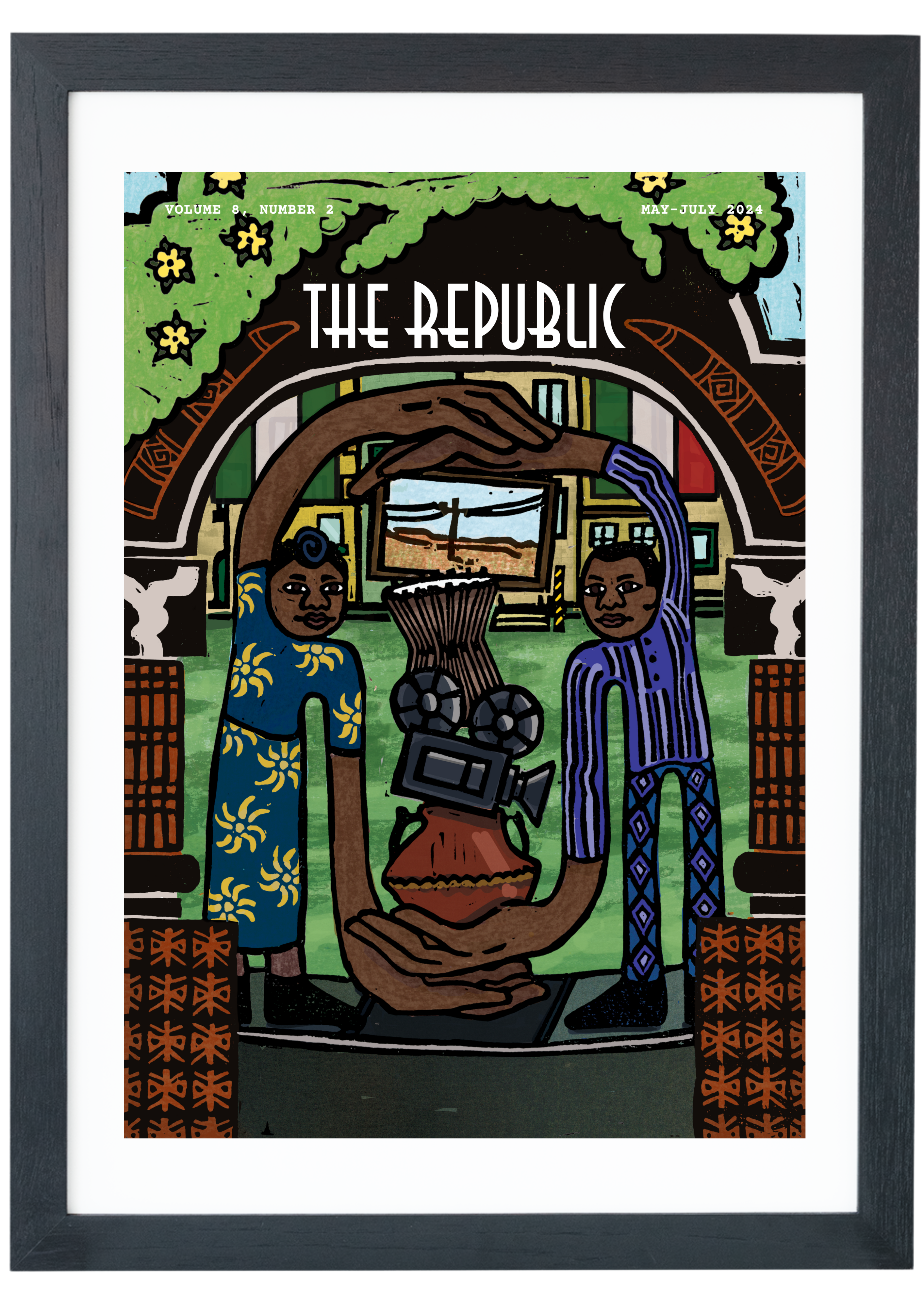 ₦140,000.00 – ₦150,000.00Select options This product has multiple variants. The options may be chosen on the product page
₦140,000.00 – ₦150,000.00Select options This product has multiple variants. The options may be chosen on the product page




